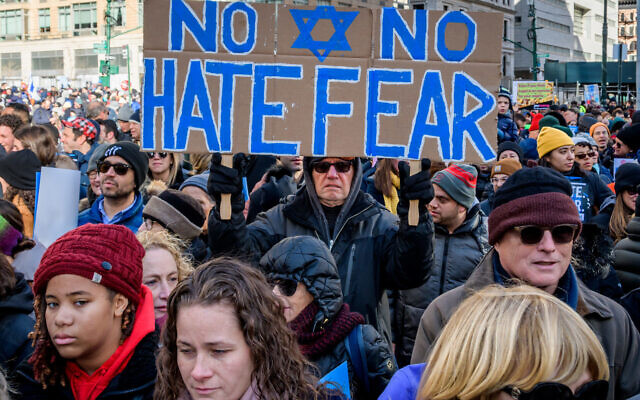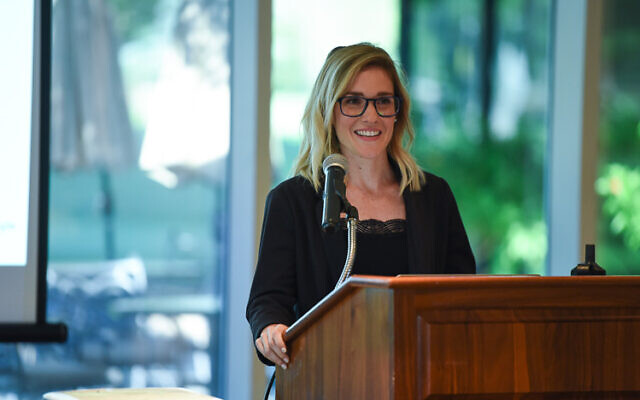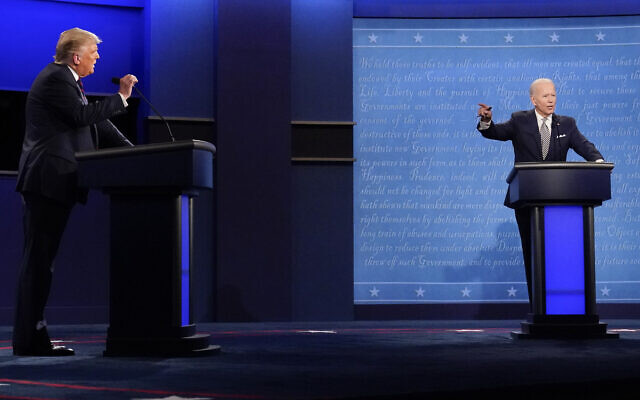T. Belman. I have no reason to doubt these polls. But believing it to be so, doesn’t make it so i.e that Republicans are antisemetic.. Too bad that party affiliation wasn’t recorded. The 52% of Americans, I would venture to say are all Democrats. Similarly I would venture to say that of the 82% , 90% are Democrats. Bottom line is that if they did a poll of Registered Democrats, they would find that nearly all of them think the GOP is antisemetic.
American Jewish Committee surveys also find 52% of all Americans think GOP holds antisemitic opinions; 82% of US Jews say antisemitism on rise in last 5 years
Thousands of New Yorkers of all backgrounds convened at the “No Hate. No Fear” solidarity march against anti-Semitism in January 2020. (Erik McGregor/LightRocket via Getty Images, via JTA)
JTA — More than two-thirds of American Jews, and slightly more than half of all Americans, believe the Republican Party holds a lot or some anti-Semitic views.
That’s one takeaway from two surveys published Monday by the American Jewish Committee, just over a week before the US elections. The surveys asked Jews and the general American public about antisemitism in the United States.
The Jewish survey found that an overwhelming majority of Jews — 88% — consider antisemitism a problem, and that most see it as a problem on the right and in the Republican Party. Those findings were in line with what the AJC, a nonpartisan advocacy organization, found when it surveyed American Jews last year. A majority of Americans overall also believe that the Republican Party holds anti-Semitic views.
“Results from both surveys indicate more Americans attribute antisemitic views to the Republican Party than attribute them to the Democratic Party,” the AJC said. “Majorities of respondents in both surveys say the Republican Party holds a lot or some antisemitic views. More than two-thirds of American Jews (69%) and over half of US adults (52%) say the Republican Party holds at least some antisemitic views, compared to 37% of American Jews and 42% of the general public who say the same about the Democratic Party.”
In addition, nearly half of Jews (49%) feel the extreme political right poses a very serious anti-Semitic threat. An additional 26% say it poses a moderately serious anti-Semitic threat. By contrast, 16% of Jews say that the extreme left poses a very serious anti-Semitic threat while the same percentage say it poses a moderately serious threat.
The surveys also found that nearly half of Americans don’t know what the phrase “anti-Semitism” means: 21% of Americans overall — more than one in five — say they’ve never even heard of the term. An additional 25% of Americans overall have heard the term but are unsure of what it means.
But nearly half of Americans overall say they have seen antagonism against Jews either online or in person during the past five years, suggesting that respondents may be familiar with the reality of anti-Jewish bigotry but unfamiliar with the term “anti-Semitism.”
American Jewish Committee’s US Director for Combating Antisemitism, Holly Huffnagle. (Courtesy)
Holly Huffnagle, AJC’s US director for combating anti-Semitism, said she believes using the term anti-Semitism is important because it covers a broad historical spectrum of how anti-Jewish discrimination manifests — from conspiracy theories to stereotypes to slurs.
“I think this is an opportunity for education on what anti-Semitism is,” she said. “If someone would have said ‘Jew-hatred, do you know what that is,’ or some other term, I think we would have seen that number a little bit less, but we need the term anti-Semitism to be understood.”
The surveys were taken in September and early October and included 1,010 Americans overall and 1,334 Jews. The margin of error for the general America sample was 3.7% and 4.2% for the Jewish sample.
The poll of Jews found that 82% say anti-Semitism in the United States has increased during the past five years. The survey numbers for Jews are statistically equivalent to those from an AJC survey taken last year, which found that 88% of Jews saw anti-Semitism as a problem in the US and 84% said it had increased during the past five years.
In this year’s survey, 43% of Jews said the status of Jews in the United States is less secure than it was a year ago, while 52% say it’s about the same and 4% say it’s more secure. Those numbers are also essentially the same as last year’s.
A quarter of Jews say they have been targeted with an anti-Semitic attack in person over the past five years. During the same period, 22% have experienced anti-Semitism online and 3% have been victim to an anti-Semitic physical attack. The poll found that about a quarter of Jews avoid publicly wearing things that identify them as Jewish and that the same percentage avoid identifying as Jews online.
A majority of Jews say that Jewish institutions they’re affiliated with have increased security in the two years since the Pittsburgh synagogue shooting. Almost 40% say their Jewish institutions have been subject to anti-Semitic graffiti, threats or attacks since the shooting, which occurred in October 2018. Ten percent of Jewish respondents said they’ve avoided visiting Jewish institutions since the shooting.
David Harris, executive director of the American Jewish Committee (courtesy)
“What American Jews and the general public are saying in these surveys, for us, is a clarion call for a stepped-up, multi-pronged response to rising antisemitism in the United States,” said AJC CEO David Harris in a statement.
A majority of Americans overall, 62%, consider anti-Semitism a problem in the United States, though while 37% of Jews consider it a very serious problem, only 19% of Americans overall agree. And while the vast majority of Jews believe anti-Semitism has gotten worse over the past five years, only 43% of Americans overall agree.
Most Americans overall also said the opinions of Jewish people and organizations make no difference to them when considering whether a statement or idea is anti-Semitic. A quarter of Americans overall said that Jews considering something anti-Semitic would make them more likely to consider it anti-Semitic, 7% said it would make them less likely to consider it anti-Semitic and 62% of people said it would make no difference.
“It comes down to this whole idea of who defines anti-Semitism,” Huffnagle said. “Is it the Jewish community? Who is the arbiter of what is anti-Semitism? Ideally it should be the Jewish community. Every other minority group gets to define the discrimination against them.”
In terms of extremism in the name of Islam, 27% of Jews say it poses a very serious threat and 26% say it poses a moderately serious threat. This set of questions was not asked of Americans overall.
US President Donald Trump, left, and Democratic presidential candidate Joe Biden, right, gesturing during the first presidential debate, September 29, 2020, at Case Western University and Cleveland Clinic, in Cleveland, Ohio. (AP Photo/Julio Cortez)
In terms of which political camp poses the greatest threat, Orthodox Jews as well as Republican Jews were split from the rest of Jewish respondents. Both Orthodox respondents and Republican respondents were much less likely to say the Republican Party holds anti-Semitic views or to say that the extreme right poses a very serious anti-Semitic threat. Those groups see that threat on the left and among Democrats instead.
Among Orthodox respondents, 66% say the extreme left poses a very or moderately serious anti-Semitic threat, and the same percentage says the Democratic Party holds anti-Semitic views. Among Republican Jewish respondents, 71% say the extreme left poses a very or moderately serious anti-Semitic threat, while 79% say the Democratic Party holds anti-Semitic views.
Huffnagle said that the data shows AJC “need[s] to increase our efforts as an organization to fight the far right.”
(The figures on US Jews’ assessments of anti-Semitism in the Republican and Democratic parties appear to be echoed in American Jewish voting patterns: An October study by the Pew Research Center found the Jewish vote in next week’s US presidential election would likely be very close to the way it has been split since 2012: 70% of American Jews plan to vote for former Vice President Joe Biden, while 27% plan to vote for President Donald Trump, with a 9.6% margin of error.)
The survey also found that a majority of Jews are at least somewhat familiar with the BDS movement, which encourages boycotts, divestment and sanctions against Israel, and that 37% consider it anti-Semitic. An additional 43% say it has some anti-Semitic supporters. Fifteen percent say the movement is not anti-Semitic.
More than three-quarters of Jews also agree it’s anti-Semitic to say “Israel has no right to exist,” “The US government only supports Israel because of Jewish money,” and “American Jews are more loyal to Israel than to America.”
While 77% of Americans overall believe that saying “Israel has no right to exist” is anti-Semitic, 55% believe it’s anti-Semitic to say “The US government only supports Israel because of Jewish money,” and half say the statement “American Jews are more loyal to Israel than to America” is anti-Semitic.







Very easy to spin this differently. About 70 percent of American Jews are Democrats and 30 percent, conservatives who vote Republican in national elections, though, not necessarily, registered as Republicans for practical reasons, as in New York City. It’s probably safe to say that 100 percent of that 30 percent of politically conservative Jews – and most Orthodox Jews are politically conservative — who vote Republican, think that it’s the Democratic party that is the antisemitic party.
I’ve been scouring youtube, and I notice that when interviewers find a Democrat voter and ask him/her to give ONE reason why they’d vote for Biden, they most often can’t think of one, and go away a bit embarrassed-I hope.
Is that why Jews joined the party of slavery, KKK, Jim Crow, Robert Bird, no school choice, the party of abortion anywhere and anytime rather than the party that got rid of slavery, the party of bill of rights!
I don’t get it!
2/3 of Jews voting for the Dems? Unlikely. I’d best the number will be in excess of 70%
@ jobardu:
More than two-thirds of American Jews (69%) and over half of US adults (52%) say the Republican Party holds at least some antisemitic views”
” compared to 37% of American Jews and 42% of the general public who say the same about the Democratic Party.”
If this is true, then there is little hope for Judaism in America. Nearly twice as many American Jews say the Republican party holds some antisemitic views compared to the number who say the Democrats hold some antisemitic views.
I don’t take these results at face value and would like to see them verified.
One verification will come next Tuesday, election day. If 2/3 of the Jews vote Democratic that will lend support to the survey..
If so we will have to think long and hard about what thinking and feeling processes led our fellow Jews to reach these counter-intuitive and counter-factual positions.
Useful idiots that believe the Fake News that is fed to them by the Left